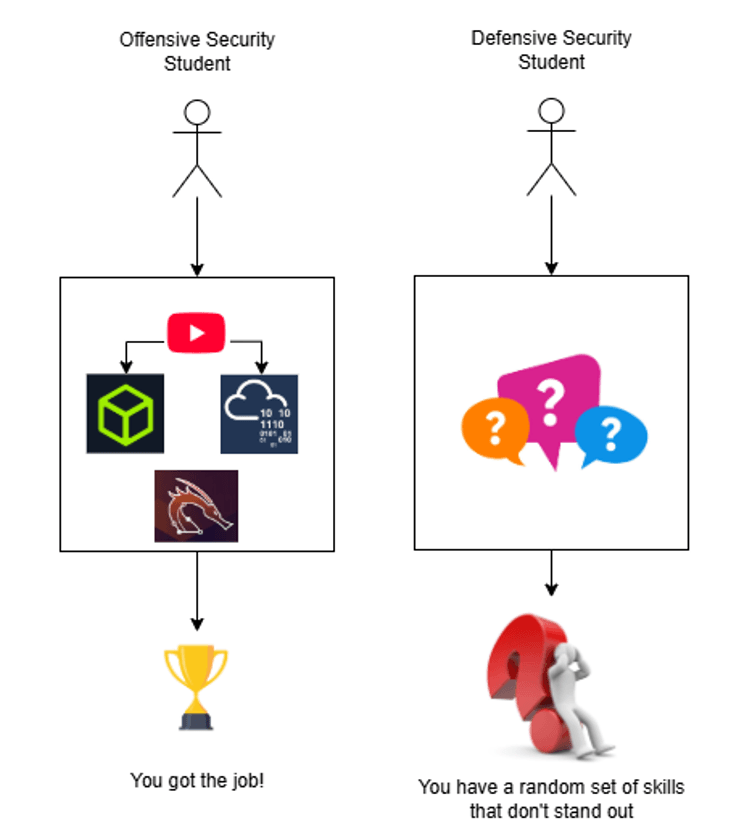When you're already in security, you take some things for granted. Before reading this article, take your mind back to a place before you got to sit down in front of that SIEM everyday, or triage those EDR alerts. You're just you in college, or just back when you were some pupil looking to break into the field.
How Everything Is Nowadays
As with anything in life, I always look to my own previous experiences for input as to why something might be the way that it is. My primary specialty is Red Teaming, so hacking into stuff, breaking things, and tinkering were my mindset right from the get-go. Around 8-9 years ago, as an aspiring penetration tester (I didn't even know what Red Teaming was at the time), there were only a few platforms you could practice your skills on. Places like HackTheBox, TryHackMe, and VulnHub immediately come to mind - and they're all doing well today. From the hacking side of the house - we have plenty to work with. Do your courses, hack your boxes, then go take your certifications and try your hardest to get a job. That's all that was expected, and generally still is. This is quite the large differential from things on the defensive side. Not only do you get a mixed bag of advice, but you are pulled in every direction for training and such. 'Go take your Security+', then there's 'Go build a homelab', some even throw in a 'Learn Python'.

How Does This Affect the Industry?
A fire hose of information for future cyber security incident responders, detection engineers, and more causes a bottle neck at the start of the funnel of the cyber security career pathway. This is why everytime you go on LinkedIn, you will see all sorts of posts of folks complaining about entry-level roles, and not being accepted (rightfully so!). The bottom line is that there are too many entry-level analysts with knowledge that is not only non-technical, but randomly assorted.
Cyber is unique, and this does not affect many other trades. Our close brothers in the Computer Science and Programming field have found a solution to this.
The Solution - How Computer Science Does It
While Computer Science is the father of all disciplines in information technology, they have already cured this ailment that so closely resembles the one Cyber Security has. Prodigies that are into computer programming, specifically, have a unique nuance to them that we believe we can integrate into our industry. Let's take, for example, two identical students with separate routines when going to college for Computer Science at an identical university. One student might go to classes all day, then go home and hang out with their friends. The other student goes to classes, and then goes home and works on specific platforms and projects. While creating projects isn't new and is certainly a leg-up in cyber, the other piece is key. Most students will go to a platform based loosely around LeetCode, and 'grind' problems. LeetCode allows them to directly prepare for technical duties at jobs in companies like Facebook, Amazon, and similar. Why does this matter? At the end of this technical gauntless of everyday challenges, you have entry-level job seekers who have a profound technical knowledge - and this has become normal! Countless subreddits, forum posts, and other communities are centered around solving these problems in the most efficient way, to the point that these major companies endorse the platform simply because it produces the BEST engineers!

The Hurdle of Homelabs
Everyone should build a homelab, but there are limits. In the industry, the only way you can practice on a Security Information and Event Management (SIEM) platform is to set it up on your own resources, think of logs to generate, generate the logs, ingest them into the platform, and much more. The difference between us and computer science is that for them to practice programming, they usually just need to install whatever language and get the coolest VSCode theme they can find.
At EpicDetect, we have built a platform where you can jump in and start grinding technical questions to outwork your peers. You can practice on a SIEM that you don't have to setup, solve problems you don't already know the answer to, and get real detection engineering and cyber security incident response experience in your most commonly used tool in the industry without going further than here.
Conclusion
Let's bring a more direct path to cyber security prodigies without shoving them over to just offensive security. Bringing competition and more technical knowledge to both entry-level folks and seasoned professionals will allow us to grow as an industry and reflect the gains that have been made within the software development space.

